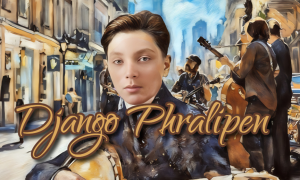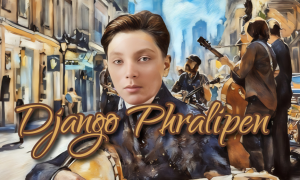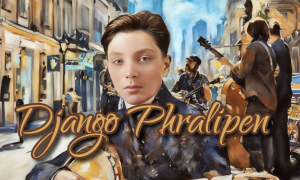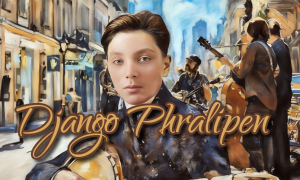Home » Jazz Articles » Django's Cosmic Echo » Chapter Six: The London Gambit
Chapter Six: The London Gambit
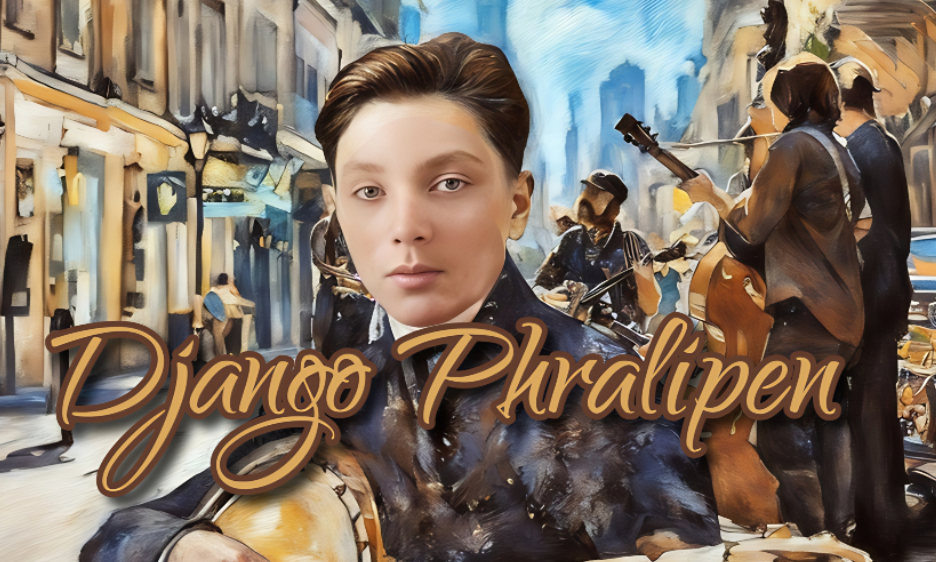
Courtesy AI
Chapters
1 | 2 | 3 | 4 | 5 | 6 | 7 | 8 | 9 | 10 | 11 | 12 | 13 | 14 | 15 | 16 | 17 | 18The Paradiso gig was more than a lightning strike; it was an earthquake. By a stroke of luck Dirk still marvelled at, The Django Phralipen Brotherhood had landed the coveted opening slot for

Pink Floyd
band / ensemble / orchestrab.1964
What they didn't fully grasp, amidst their euphoria, was that their set had been witnessed by a particularly crucial pair of ears. Geoff Litchman, a sharp-suited A&R man from EMI's prestigious Columbia UK label—Pink Floyd's label—had naturally been in attendance. He'd been backstage, perhaps half-distractedly going over notes while Pink Floyd were still in their dressing room, when the support band began. Then Django's guitar had cut through the usual pre-show murmur, sharp and brilliant as a diamond. Litchman, a man whose career depended on recognizing the subtle frequency of nascent stardom, found himself drawn to the side of the stage. He watched, rooted to the spot, as this impossibly young guitarist played with a fire and finesse that was simply otherworldly, miles above almost anyone on Columbia's current rock roster. The main act could wait; this was something else entirely.
Dirk Bakker, with his own quiet history as a touring musician, had naturally fallen into the role of the Brotherhood's de facto manager—booking gigs, offering advice, and acting as a buffer against the more predatory elements of the scene. The day after the Paradiso triumph, the bell above his record shop door chimed, and in walked Geoff Litchman.
Litchman, all British cool and understated confidence, introduced himself. He praised the band, then quickly zeroed in. "Your guitarist, Django Phralipen," he said, browsing a rack of jazz LPs as if his interest were casual. "Quite extraordinary. We at Columbia are always looking for exceptional talent. I'd be interested in getting them into a studio in London, lay down a few tracks. An audition, if you will."
Dirk, tamping tobacco into his pipe, listened with a placid expression that hid a keen, analytical mind. He'd seen men like Litchman before. "The whole band, you mean?" he asked, his tone mild. Litchman gave a noncommittal shrug. "Of course, the band. But it's the guitarist... he's the one with that... spark." Dirk nodded slowly. Coy, but the message was clear. Litchman was sniffing around Django, specifically. "Django is the heart of the group, true," Dirk agreed. "Let me speak with him. Perhaps you could return tomorrow? Say, lunchtime?" Litchman agreed, a flicker of satisfaction in his eyes.
Later that afternoon, Django burst into the shop, still radiating the electric charge of the Paradiso performance. "Dirk! You should have heard them! They loved us!" Dirk smiled. "I heard, son. I was there, remember? And it seems you made quite an impression on more than just the audience." He relayed Litchman's visit, the interest from EMI/Columbia, the offer of a London audition. Django, still high on adrenaline, was momentarily stunned into silence. Then, his face split into a wide grin. "London? A studio? EMI?" His eyes then fixed on Dirk. "This is big, Dirk! We need a manager.
You! You'll be our manager, right?"
Dirk chuckled, a self-deprecating sound. "Django, I'm just an old record shop owner. This EMI is big league. You need someone who knows the ropes, a professional." Django's expression turned serious. "Dirk, you are officially my uncle, the only family I have in this world. You're the only person I truly trust. You know music, you know the business from your own days, and most importantly, you know me. Why in the world would I let some stranger I've never met be my manager? It's you, or no one."
Dirk felt a warmth spread through his chest. The boy's loyalty was a fierce, unwavering thing. "Alright, Django," he said softly. "If you insist. I'll do my best for you, for the Brotherhood." He paused, then added, "There's something you should know, though. Litchman... he was polite about it, but I got the distinct impression he's really interested in you. Not necessarily the whole group."
Django's elation visibly ebbed, the bright light in his eyes dimming. He turned away, staring unseeingly at a poster of

Thelonious Monk
piano1917 - 1982
He paced the small space between the record racks. "If I were just playing pure jazz, straight-up Manouche, maybe I'd look for different players, sure. But this is... different. When

Django Reinhardt
guitar1910 - 1953
Django stopped, his eyes blazing with conviction. "I want people to move to my music. That primal urge, that connection, that's what makes music popular, not just complexity for its own sake. I want to play great music that makes young people sway and dance, or shut their eyes and feel the flow. I don't care what label they put on it—jazz, rock, whatever." He gestured towards his Gibson, leaning against a stack of LPs. "With the amps and guitars of today, I want to take what the first Django was doing, that fire and beauty, and bring it to a new place. Reach a mass audience of people my age, and anyone else who cares to come along for the ride. And I want to do it with my Brotherhood."
Dirk listened, a slow, wry smile spreading across his face. The kid had a vision, clear and powerful. And he wasn't wrong. "I've got an idea, Django," Dirk said, the smile turning into a mischievous glint. "

Ronnie Scott
saxophone, tenor1927 - 1996
Without waiting for a reply, though he saw the dawning excitement in Django's eyes, Dirk went into his small back office. He rummaged through an old address book, its pages soft and yellowed, found a London number, and dialed. "Ronnie? Dirk Bakker here... Yes, Bakker, you old reprobate, from the SS Oranje... Fine, fine. Listen, Ronnie, I'm calling in that favor you've owed me since that card game in steerage... I've got a guitarist here... a kid, but plays like... well, you'll see. EMI are sniffing around him already... Yes, the whole band. The Django Phralipen Brotherhood... Look, just give us a night, maybe two. You won't regret it." Ronnie Scott, on the other end, had heard similar pitches a thousand times. But Dirk Bakker wasn't a man to oversell, and the mention of EMI's interest added weight. Based on their old friendship and Dirk's uncharacteristic urgency, he agreed. "Alright, Dirk, for you. Two nights. A Tuesday and Wednesday, three weeks from now. But they better be bloody good."
The next day, Geoff Litchman treated Dirk and Django to lunch at an upscale hotel restaurant, clearly expecting the young guitarist to be suitably overwhelmed by the prospect of an EMI audition. Dirk had coached Django: be polite, reserved, but warm and friendly. Don't seem too eager. When Litchman, over coffee, brought up the specifics of the London studio audition, Dirk leaned back, a picture of avuncular calm. "Actually, Geoff," Dirk said smoothly, "as it happens, the Brotherhood will be in London in a few weeks anyway. We've got a two-night engagement at Ronnie Scott's. Perhaps you and your colleagues from EMI might like to catch one of our sets there? See them in their natural habitat, so to speak."
Litchman, who had been about to take a sip of his espresso, paused, his cup halfway to his lips. His carefully constructed professional cool visibly cracked. He'd thought he'd stumbled upon a diamond in the rough, a naive prodigy he could quickly sign on his terms. Ronnie Scott's? That was a different league of maneuvering altogether. The old Dutchman and the kid were playing a savvier game than he'd anticipated. He slowly lowered his cup. "Ronnie Scott's, you say?"
Story by Alan Bryson, edited and assisted by AI.
Disclaimer: This is a fictional account exploring what might have happened if a temporal quantum event had occurred. While real musicians and historical figures appear within these pages, they exist here in an alternate timeline—a reality that quantum theory suggests was possible, but that never came to pass. All interactions, conversations, and events involving these individuals are entirely fictional, products of a world that exists only in the space between what was and what might have been.
Tags
Comments
PREVIOUS / NEXT
Support All About Jazz
 All About Jazz has been a pillar of jazz since 1995, championing it as an art form and, more importantly, supporting the musicians who make it. Our enduring commitment has made "AAJ" one of the most culturally important websites of its kind, read by hundreds of thousands of fans, musicians and industry figures every month.
All About Jazz has been a pillar of jazz since 1995, championing it as an art form and, more importantly, supporting the musicians who make it. Our enduring commitment has made "AAJ" one of the most culturally important websites of its kind, read by hundreds of thousands of fans, musicians and industry figures every month.


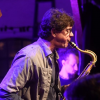
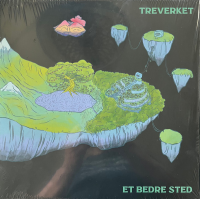

 Buy Now
Buy Now






